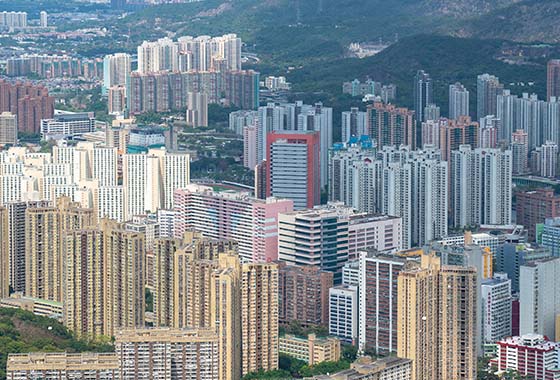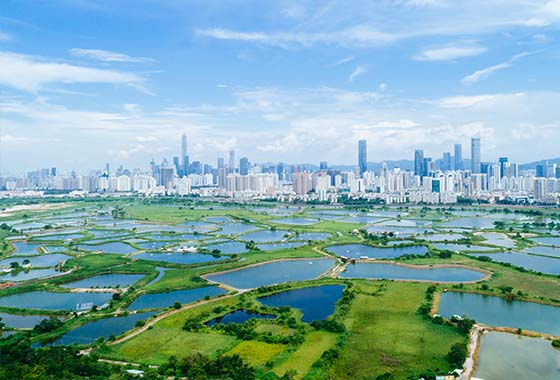Our Hong Kong Foundation Releases First Research Report on Land and Housing
Advocates “Subsidized Homeownership Scheme” and the Expedition of Land Supply
Our Hong Kong Foundation today released its first research report on the subject of land and housing, proposing that the Government launches a “Subsidized Homeownership Scheme” and advocating an increase in land supply by expediting reclamation, changing land use, and implementing new development areas.
The Subsidized Homeownership Scheme suggests that all public housing units constructed in the future be built with property ownership by residents as the goal. The scheme also recommends relaxing the current policy for calculating premium for public housing units, in order to help families who cannot afford the prevailing market prices to purchase their flats.

Mrs Eva Cheng, Executive Director of the Foundation; and Mr Stephen Wong, the Foundation’s Deputy Executive Director and Head of Public Policy (left to right).
The report says increasing land supply could provide a complete solution to Hong Kong’s land shortage problem, which has led to soaring property prices and hindered the development of various livelihood facilities. It also recommends that the Government review existing vetting procedures and speed up approval processes with a view to expediting land supply.
This is the first time the Foundation has produced a research report that studies Hong Kong’s current situation and future development. Titled “Maximizing Land Use to Boost Development; Optimizing Housing Resources to Benefit All”, the report makes recommendations based on in-depth research into Hong Kong’s land and housing policies. The project was led by Prof Richard Wong Yue-chim, Chair Professor of Economics at the University of Hong Kong and also an Adviser to the Foundation, and supported by members of the Foundation’s Research Department. Announcing the results alongside Prof Wong were Mrs Eva Cheng, Executive Director of the Foundation; Mr Stephen Wong, the Foundation’s Deputy Executive Director and Head of Public Policy; and Mr William Tsang, Researcher at the Foundation.
The study notes that Hong Kong’s residential property prices in 2015 are 38% higher than London’s and 68% higher than New York’s, while living space per person is only two thirds or less that of Shanghai, Singapore and Shenzhen. According to the 2011 Population Census, only 53% of Hong Kong’s 2.37 million households owned their properties, with 18% (or 450,000 households) being owners of public housing (Tenant Purchase Scheme) units or flats under the Home Ownership Scheme. Among these, 380,000 households do not have total ownership of their property because they have not paid the premium to the Government and therefore cannot trade their units in the free market.
In terms of land development, Hong Kong has reclaimed less than 100 hectares of land in the past decade, representing just a small fraction of the more than 1,000 hectares reclaimed in the previous decade. The situation is tantamount to Hong Kong’s reclamation work grinding to a halt.
The study says implementing the Subsidized Homeownership Scheme and relaxing the current policy for calculating premium would enable more families to enjoy the fruits of Hong Kong’s economic prosperity by enabling them to become genuine property owners. The study also notes that land shortage is the root cause of the city’s housing problem, adding that that in order to meet the needs of a projected additional population of approximately 1.2 million, continue the city’s economic development and build adequate social amenities, Hong Kong must create 9,000 hectares of land – equivalent to three Sha Tin New Towns – in the next 30 years.
Prof Wong said, “To comprehensively improve the housing situation for Hong Kong’s grassroots, we recommend that all public housing units constructed in future be built with property ownership as the goal. They should be categorized into subsidized sale units for households that can afford to buy them, and ‘rent first, buy later’ units to enable households that cannot afford to buy flats right away to rent for a certain period of time before purchasing them.
“To keep families in public housing from having to chase after a constantly rising target of premium compensation, we propose a few options for calculating premium for the public to discuss,” Prof Wong added. “First, the premium could be locked in at the year of occupation, regardless of the changes in property values afterwards. Second, a more attractive, discounted premium could be offered and be locked at that specific amount. Third, we could compare the premium in the year of occupation with market premium at the time the residents want to take ownership, and charge the lower of the two. Fourth, the premium could be totally subsidized by the Government, as in the case of Singapore.
“The long-term objective of the Subsidized Homeownership Scheme is for 80% of households in Hong Kong to own their property, and allow the grassroots to “trade-up” their property, rebuild the housing ladder and share in the fruits of Hong Kong’s economic prosperity. The proposed scheme, which is more attractive than the current mechanism, renders a higher chance of recovering part of the construction costs of public housing. This not only releases the value of these housing resources, but also provides financial resources for other urgently needed social expenditures – indeed a multiple-win scenario,” he concluded.
On the issue of land supply, the research report recommends that the Government expedites changing land use and implementing new development areas. It added that for the long term, the Government must build up its land reserves and rectify the imbalance between supply and demand in accordance with market changes. Meanwhile, the Government should also review its existing vetting procedures to facilitate land development.
Mr William Tsang, Researcher at the Foundation, said, “For us, reclamation has always been the most effective method to create land. The Government’s proposals to build a 700-hectare artificial island between Hong Kong Island and Lantau Island and a 1,000-plus-hectare artificial island south of Cheung Chau are worth considering. In addition, it should be noted that green zones and country parks occupy 67% of Hong Kong’s land area, which is much higher than the 38% in London and 8% in Singapore. While sea and green zones have undisputed environmental value, we also think that in light of our acute problem of land shortage, the society should rationally discuss and analyze this issue in a flexible manner. Our goals should be sparing the much needed space for development under the critical premise of protecting nature and the environment.”
Mr Stephen Wong, the Foundation’s Deputy Executive Director and Head of Public Policy, said, “In order to improve Hong Kong’s housing and land situation, we hope that the Government will push these issues forward and seriously consider ways to expedite approval processes. This could be achieved by clearly delineating departmental roles and responsibilities as well as streamlining the vetting process, reforming the current system of Comprehensive Development Areas (CDAs) to reduce restrictions on development, and enhancing transparency in the mechanism of land premium calculation.”
The Foundation’s Executive Director, Mrs Eva Cheng, said, “Land supply is the prerequisite for economic development, improved livelihoods and stable, happy lives. Through its research, the Foundation aims to make recommendations on land and housing in stages and by category, for discussion by the wider community. Our goal is to put forward proposals that stimulate discussion across the society so that Hong Kong can benefit from everyone’s input. We encourage people to voice their views and contribute to the sustainable development of Hong Kong.”



